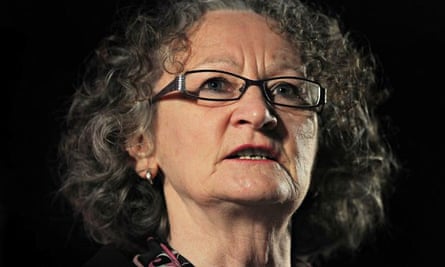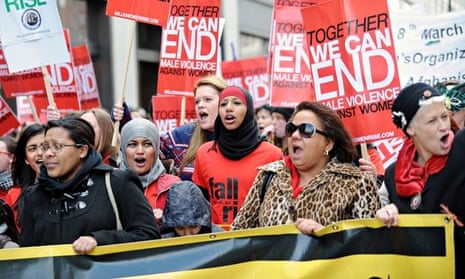The Metropolitan police has been warned it risks breaching the European convention on human rights by refusing to police a second planned protest in central London next month.
For the past seven years campaigners have marked International Women’s Day by marching through the UK capital in an event that has always been stewarded by the police. But this year the organisers of the Million Women Rise (MWR) rally say they have, in effect, been asked to pay for the right to protest.
The Met told them that if they want to go ahead with the march on 7 March, they would need to employ their own private security firm and formulate a road closure plan. Such measures would cost at least £10,000, MWR says.
The force has issued a similar ultimatum to the Campaign Against Climate Change, which plans to demonstrate in the area on the same day.
The Met commissioner, Sir Bernard Hogan-Howe, faces questions in parliament and the London assembly about whether his force is trying to block peaceful protest.
Liberal Democrat MP Julian Huppert, a member of the Commons home affairs select committee, said: “The Met need to assure us that what they are doing doesn’t effectively block peaceful protest by groups that do not have large cash resources. It cannot be right for the Met police to effectively be able to veto peaceful protests. I think it would be very helpful for the committee to ask the commissioner of the Met police to explain what he is doing to ensure that peaceful protest is still allowed.”

The Met argues that it does not need to police the events because they are expected to be crime-free. Ch Supt Colin Morgan said: “This is not a case of police charging for the their services but more a matter of refusing to use the public purse to provide a traffic management plan or stewarding for a private event.”
James Welch, legal director for Liberty, the human rights group, accused the Met and Westminster council – which is refusing to organise the necessary road closures – of jeopardising the right to protest. He said: “The actions of the police and other public bodies in hindering these marches appear to be setting dangerous precedents ill-befitting the world’s longest unbroken democracy. The European convention on human rights doesn’t say ‘everyone has the right to freedom of peaceful assembly – if they have the financial means’.”
Lady Jones, a Green party member of the London assembly and deputy chair of its police and crime committee, has written to the leaders of the Met and the council urging them to reconsider.
In her letter to Hogan-Howe, Jones said the police had missed the point about public protests. “To dismiss a public demonstration as a private event seems to misunderstand the nature of protest,” she wrote. “To claim because an event will be peaceful it does not require a police operation seems to perversely reward potentially violent protests while financially penalising peaceful ones.”
Jones told the Guardian: “Charging individuals or organisations to protest, is in effect, banning protest for those who cannot afford to pay. It’s part of a new pattern of restricting the right to protest.”
She said the decision by the police and the council had worrying wider implications. “It will affect other groups, like the TUC and NUS, next time they wish to protest. If a demonstration does not require a policing presence then the council should close the roads and allow the march to steward itself, rather than slapping the organisers with a bill.”
Simon Natas, a solicitor representing the organisers of the MWR march, said: “It sounds to me as if the the police have decided that this is a policy of some sort, because they have said exactly the same thing to the Campaign Against Climate Change as they said to MWR. This looks like the first weekend of the policy. It obviously has something to do with budgetary constraints.”
He said the Met and Westminster were “flirting” with breaching the European protected right to protest and should clarify their positions. “We hope the police or Westminster council will back down. It is not a sustainable legal position to take because the European court of human rights has said that authorities have a legal duty to facilitate the rights of free expression and the rights of free assembly, and they can’t directly or indirectly inhibit it,” Natass said. “To say you can’t march unless you pay several thousand pounds for a traffic plan is an indirect prohibition.”
Sabrina Qureshi, founder of the MWR march, said the organisers planned to proceed with the event, but the authorities’ stance could deter people from taking part. Writing for Comment is free. she said: “Without a positive police presence at the march, some women may feel vulnerable and unsafe and this may discourage some from participating.”
A spokesperson for Westminster city council said: “Our position in relation to protests has not changed; we fully recognise the democratic right to protest and organisers have not been subjected to any new Council requirements, restrictions or fees.
“The Metropolitan police is the lead agency in managing demonstrations across Westminster and we support the police in their role of facilitating safe and successful protests and demonstrations. We continue to support the Police in discussions with the organisers of these two marches to ensure they can go ahead safely.”
